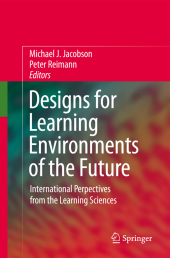 Neuerscheinungen 2014Stand: 2020-02-01 |
Schnellsuche
ISBN/Stichwort/Autor
|
Herderstraße 10
10625 Berlin
Tel.: 030 315 714 16
Fax 030 315 714 14
info@buchspektrum.de |

Michael Jacobson, Peter Reimann
(Beteiligte)
Designs for Learning Environments of the Future
International Perspectives from the Learning Sciences
Herausgegeben von Jacobson, Michael; Reimann, Peter
2010. 2014. xi, 291 S. 235 mm
Verlag/Jahr: SPRINGER, BERLIN; SPRINGER US; SPRINGER 2014
ISBN: 1-489-98363-5 (1489983635)
Neue ISBN: 978-1-489-98363-3 (9781489983633)
Preis und Lieferzeit: Bitte klicken
This book presents current research by leading scientists around the world who are exploring the design of technologies that may form the foundations of learning environments of the future. Screenshots and URLs to project websites are provided within the text.
Few things are as certain as societal changes-and the pressing need for educators to prepare students with the knowledge and ways of thinking necessary for the challenges in a changing world. In the forward-thinking pages of Designs for Learning Environments of the Future , international teams of researchers present emerging developments and findings in learning sciences and technologies at the infrastructure, curricular, and classroom levels.
Focusing on ideas about designing innovative environments for learning in areas such as biology, engineering, genetics, mathematics, and computer science, the book surveys a range of learning technologies being explored around the world-a spectrum as diverse as digital media, computer modeling, and 3D virtual worlds-and addresses challenges arising from their design and use. The editors´ holistic perspective frames these innovations as not only discrete technologies but as flexible learning environments that foster student engagement, participation, and collaboration. Contributors describe possibilities for teaching and learning in these and other cutting-edge areas:
Working with hypermodels and model-based reasoning
Using visual representations in teaching abstract concepts
Designing strategies for learning in virtual worlds
Supporting net-based collaborative teams
Integrating innovative learning technologies into schools
Developing personal learning communities
Designs for Learning Environments of the Future will enhance the work of a wide range of professionals, including researchers and graduate students in the learning and cognitive sciences, and educators in the physical and social sciences.
Preface, Michael J. Jacobson and Peter Reimann Chapter 1. Invention and Innovation in Designing Future Learning Environments, Michael J. Jacobson and Peter Reimann Chapter 2. MaterialSim: A Constructionist Agent-based Modeling Approach to Engineering Education, Paulo Blikstein and Uri Wilensky Chapter 3. Learning Genetics from Dragons: From Computer-Based Manipulatives to Hypermodels, Paul Horwitz, Janice D. Gobert, Barbara C. Buckley, and Laura M. O´Dwyer Chapter 4. The Development of River City, a Multi-User Virtual Environment-based Scientific Inquiry Curriculum: Historical and Design Evolutions, Diane Jass Ketelhut, Jody Clarke, and Brian Carl Nelson Chapter 5. Design Perspectives for Learning in Virtual Worlds, Michael J. Jacobson, Beaumie Kim, Chunyan Miao, Zhiqi Shen, and Mark Chavez Chapter 6. Learning to Learn and Work in Net-based Teams: Supporting Emergent Collaboration with Visualization Tools, Peter Reimann and Judy Kay Chapter 7. Learning Mathematics Through Inquiry: A Large Scale Evaluation, Ton de Jong, Petra Hendrikse, and Hans van der Meij Chapter 8. Scaffolding Knowledge Communities in the Classroom: New Opportunities in the Web 2.0 Era, Vanessa Peters and James D. Slotta Chapter 9. From New Technological Infrastructures to Curricular Activity Systems: Advanced Designs for Teaching and Learning, Jeremy Roschelle, Jennifer Knudsen, and Stephen Hegedus Chapter 10. Towards a Theory of Personalized Learning Communities, Eric Hamilton and Martine Jago Chatper 11. Afterword:Opportunities for Transformational Learning, Peter Reimann and Michael J. Jacobson


